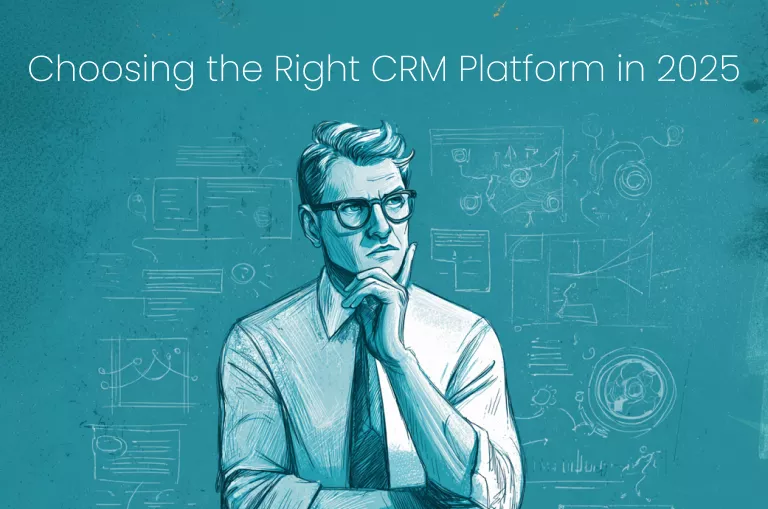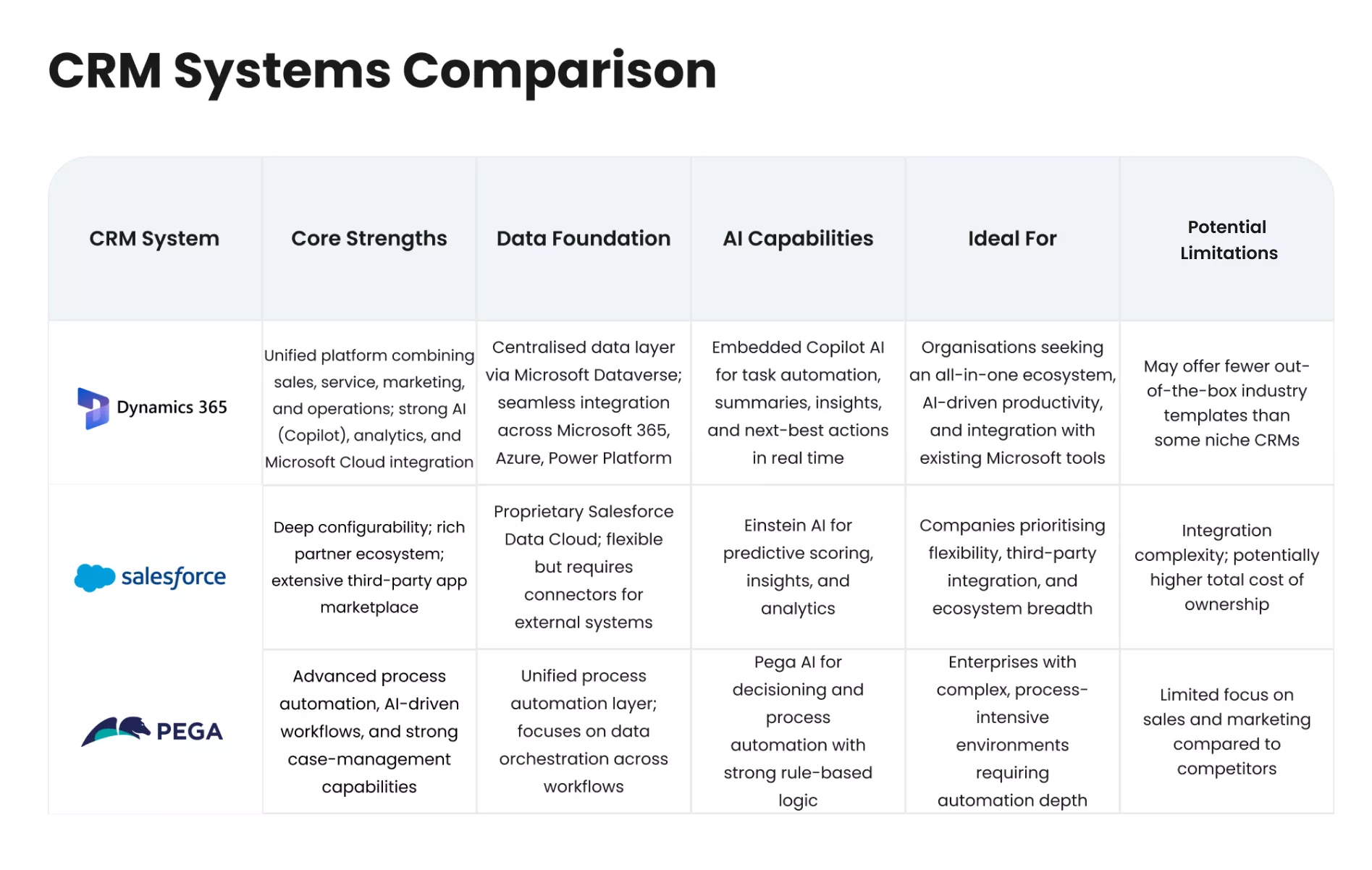Choosing the Right CRM Platform in 2025: How Microsoft Dynamics 365 Measures Up

Choosing the Right CRM Platform in 2025: How Microsoft Dynamics 365 Measures Up
Customer expectations are evolving faster than ever, and businesses are rethinking how they connect with clients across every touchpoint. A modern CRM is no longer just a sales tool - it’s the backbone of digital engagement, data-driven decisions, and AI-assisted productivity. With new analyst reports from Forrester and Gartner setting the tone for 2025, now is the perfect time to examine how Microsoft Dynamics 365 compares with other leading CRM platforms.
The evolving CRM landscape
CRM systems have become critical to how organisations build and maintain customer relationships. Yet, as Forrester points out, the market is “on the cusp of change”, driven by the rapid rise of AI and the demand for simplified, intuitive user experiences.
Businesses are facing new pressures: customers expect real-time personalisation, teams need unified data across departments, and leaders must prove ROI on digital investments. Traditional, disconnected systems can’t keep up. Fragmented stacks often lead to duplicated effort, poor visibility, and missed opportunities. The direction of travel is clear - organisations are moving towards platforms that centralise data and enable consistent, intelligent engagement across the entire customer journey.
Why analyst recognition matters
When choosing a CRM, independent research carries weight. Analyst evaluations from Forrester and Gartner provide a structured comparison of leading platforms based on innovation, performance, and market presence.
The Forrester Wave: Customer Relationship Management Software, Q1 2025, recognises Microsoft as a Leader, highlighting its AI capabilities, unified platform, and strong ecosystem.
Similarly, Gartner named Microsoft a Leader in the 2025 Magic Quadrant for Sales Force Automation Platforms, marking the fifteenth consecutive year it has achieved this position.
For decision-makers, these reports offer more than validation. They provide reassurance that the platform has a clear roadmap, financial stability, and proven delivery capability.
How Microsoft Dynamics 365 stands out
Microsoft’s leadership in both reports is no coincidence. Dynamics 365 combines sales, service, marketing, and operations into one cohesive platform, built on the secure and scalable Microsoft Cloud.
Forrester highlights its strength in unified data and usability across multiple business functions. The foundation of the platform, Microsoft Dataverse, connects information from all departments, creating a single, reliable view of each customer.
AI plays a central role. Dynamics 365 Copilot enables sales and service teams to automate routine tasks, summarise client interactions, and surface next-best actions in real time. This level of embedded intelligence helps teams focus on what matters most: building relationships and driving outcomes.
For organisations already using Microsoft 365 or Azure, the benefits compound further. Integration is native, security is consistent, and data governance stays under one umbrella. For many enterprises, this unified ecosystem translates into faster deployments and lower long-term costs of ownership.
How other CRM platforms compare
While Dynamics 365 earned top recognition, it isn’t the only strong player. Forrester named Pega CRM a Leader in the same 2025 report, citing its robust workflow and AI capabilities. Salesforce also continues to be a Leader in Gartner’s Magic Quadrant for Sales Force Automation.

However, each platform approaches the CRM challenge differently. Salesforce offers extensive configurability and a deep ecosystem, but it can require complex integration efforts. Pega focuses on process automation and case management, which appeals to specific industries. Microsoft’s advantage lies in providing a single, extensible platform that blends productivity, collaboration, and customer engagement tools without requiring multiple vendors.
The right choice depends on the organisation’s needs, whether that’s industry specialisation, deployment speed, scalability, or total cost of ownership.
| Criteria | Microsoft Dynamics 365 | Salesforce Sales Cloud | Pega CRM |
| Core Strengths | Unified platform combining sales, service, marketing, and operations; strong AI (Copilot), analytics, and Microsoft Cloud integration | Deep configurability; rich partner ecosystem; extensive third-party app marketplace | Advanced process automation, AI-driven workflows, and strong case-management capabilities |
| Data Foundation | Centralised data layer via Microsoft Dataverse; seamless integration across Microsoft 365, Azure, Power Platform | Proprietary Salesforce Data Cloud; flexible but requires connectors for external systems | Unified process automation layer; focuses on data orchestration across workflows |
| AI Capabilities | Embedded Copilot AI for task automation, summaries, insights, and next-best actions in real time | Einstein AI for predictive scoring, insights, and analytics | Pega AI for decisioning and process automation with strong rule-based logic |
| Integration & Ecosystem | Deep native integration with Microsoft 365, Teams, Fabric, and Power BI; open APIs for extensions | Broad app marketplace (AppExchange) with thousands of integrations; strong ecosystem, but can be complex to manage | Integrates well with legacy systems; focuses on workflow automation over broad ecosystem depth |
| Ease of Deployment | Streamlined for organisations already using Microsoft Cloud; consistent security and governance | Highly configurable but may require longer setup and specialised admin skills | Often needs custom implementation; suitable for complex enterprise workflows |
| Scalability | Enterprise-grade scalability through Azure; suitable for multi-region operations | Highly scalable SaaS model; performance proven at global scale | Scales effectively in regulated industries and large enterprises |
| Ideal For | Organisations seeking an all-in-one ecosystem, AI-driven productivity, and integration with existing Microsoft tools | Companies prioritising flexibility, third-party integration, and ecosystem breadth | Enterprises with complex, process-intensive environments requiring automation depth |
| Potential Limitations | May offer fewer out-of-the-box industry templates than some niche CRMs | Integration complexity; potentially higher total cost of ownership |
Limited focus on sales and marketing compared to competitors |
Practical benefits
Microsoft’s recent enhancements in Dynamics 365 directly address productivity challenges. In Gartner’s assessment, AI features such as Copilot in Dynamics 365 Sales streamline everyday work, helping sales teams draft emails, summarise calls, and analyse pipelines automatically.
The unified data foundation also helps break down silos between departments. Teams across marketing, service, and operations access the same real-time insights, leading to faster response times and more consistent customer experiences.
For innovation leaders, this means a future-ready CRM that aligns with broader digital transformation strategies. For operations managers, it means measurable efficiencies: less tool switching, reduced administrative workload, and improved satisfaction for both customers and employees.
Key challenges, myths and decision pitfalls
Choosing a CRM is a strategic decision, and common misconceptions can lead to missteps.
One myth is that simply adding AI will solve productivity issues. Forrester notes that without solid data foundations and user adoption, even the smartest tools deliver limited value (Forrester). Success depends on the quality of your data, the clarity of your processes, and the willingness of teams to embrace new tools.
Another risk is over-engineering. Many vendors promote extensive feature sets, but complexity can slow implementation and dilute business impact. The best CRM isn’t necessarily the one with the longest feature list - it’s the one that fits your organisation’s maturity and culture.
Finally, some assume that the highest-ranked vendor automatically represents the best choice. Analyst rankings are valuable guides, but the ultimate decision should reflect business goals, budget, and readiness for change.
Looking ahead: CRM in 2026 and beyond
Analysts expect CRM systems to continue evolving towards deeper AI integration and autonomous decision-making. Gartner predicts that by 2028, up to 15% of daily work decisions will be made autonomously by AI agents.
As customer journeys become more dynamic, CRMs will need to connect seamlessly with marketing, service, and analytics platforms. Vendors that offer a cohesive ecosystem, such as Microsoft’s integration of Dynamics 365 with Power Platform and Fabric, will be better positioned to help businesses adapt quickly.
Forward-thinking organisations are already planning for this shift, ensuring their technology stack is flexible enough to keep pace with innovation.
Conclusion
The 2025 analyst reports confirm what many businesses already know: the CRM market is maturing, and intelligent, unified platforms are leading the way. Microsoft Dynamics 365 has earned its place among the leaders, with strong recognition from both Forrester and Gartner for its innovation, usability, and AI-driven approach.
But the real value lies in how well the platform aligns with your organisation’s strategy. For some, Microsoft’s connected ecosystem and embedded intelligence will offer unmatched synergy. For others, niche solutions may better serve specific needs.
If you’re considering your next CRM move, now is the time to assess your current setup, define your objectives, and map them against what the market’s top platforms can deliver.
Ready to explore what Dynamics 365 could mean for your organisation?
Contact ARP Ideas for a tailored consultation on CRM strategy, platform evaluation, and digital transformation planning.

